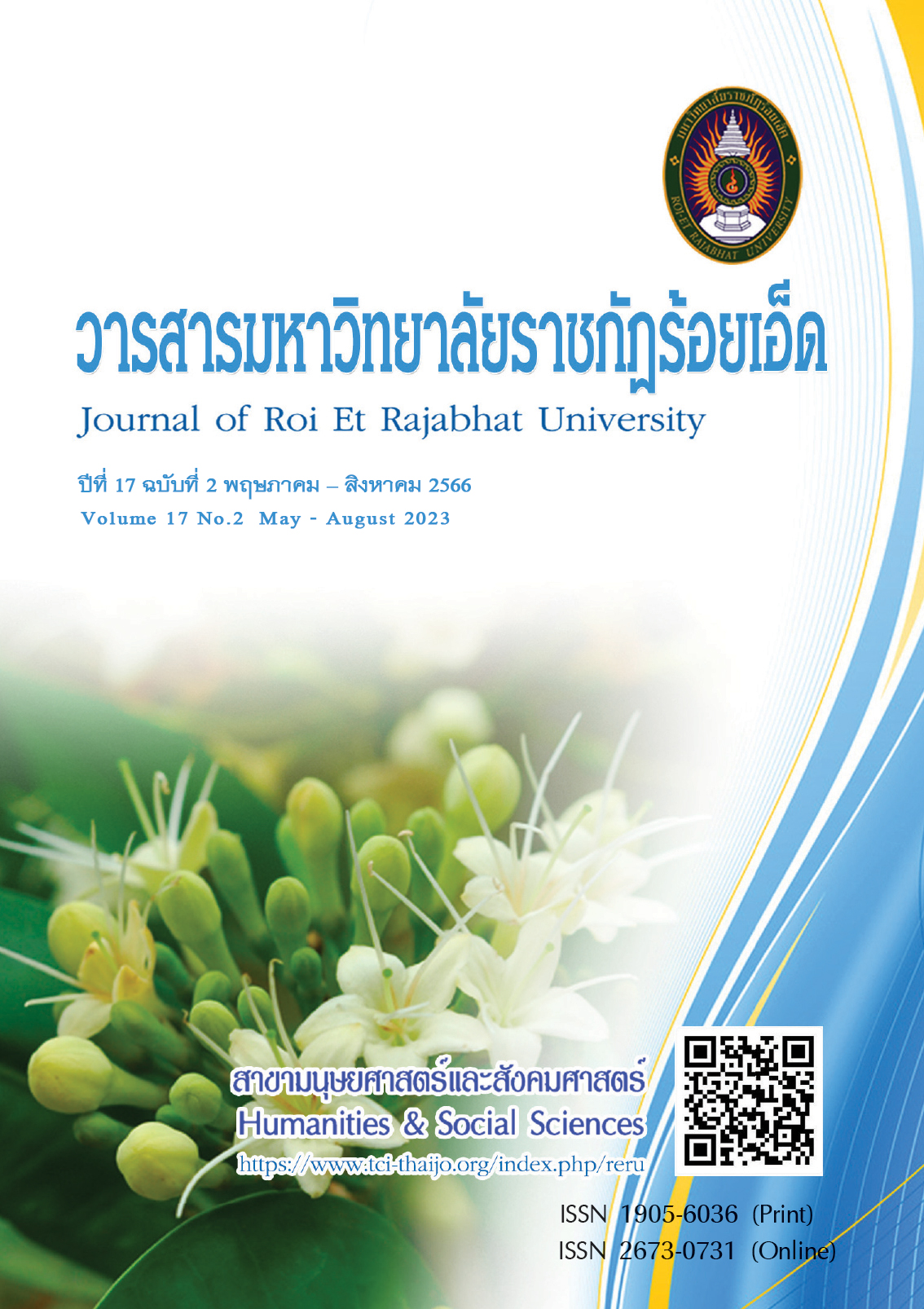Inclusive Education Administration of School under The Office of The Secondary Educational Service Area
Keywords:
Inclusive Education Administration, Inclusive Education, Education AdministrationAbstract
The purposes of this research were to 1) examine the components of integrated learning management in schools under the supervision of the Secondary Educational Service Area Office, and
2) confirm the components of integrated learning management in schools under the supervision of
the Secondary Educational Service Area Office. The study sample comprised 95 schools affiliated
with the Secondary Educational Service Area Office. Each school was represented by four informants, including the school director, deputy director, academic administration representative, head of the learning group, and teachers responsible for overseeing the overall study. A collective of 380 individuals serving as informants The research instruments comprised two questionnaires, namely: 1) an opinion questionnaire and
2) a component confirmation questionnaire. The statistics used in the research were frequency, percentage, arithmetic mean, standards deviation, exploratory factor analysis, and content analysis. The results of
the study were as follows:1) the inclusive educational administration of schools under the supervision of the Secondary Educational Service Area Office consisted of four components: 1.1) administration,
1.2) organizational leadership, 1.3) teaching and learning administration, and 1.4) learning assistance,
and 2) The findings of the confirmation of the inclusive education management components of schools under the Secondary Educational Service Area Office and experts agree that the inclusive education management components of schools under the Secondary Educational Service Area Office are accurate, appropriate, feasible, and beneficial.
References
ทนงศักดิ์ สุระคำแหง. (2548). คนพิการ. กรุงเทพฯ: สำนักงานเลขาธิการสภาผู้แทนราษฎร.
ธัญลักษณ์ จันทร์ศรี. (2562). การพัฒนารูปแบบการบริหารการศึกษาพิเศษของโรงเรียนต้นแบบการเรียนรวม สำนักงานศึกษาธิการภาค 14. ดุษฎีนิพนธ์ ปรัชญาดุษฎีบัณฑิต สาขาวิชาภาวะผู้นำและการบริหาร. สุรินทร์: มหาวิทยาลัย
ราชภัฏสุรินทร์.
นงค์รักษ์ เคนไชยวงศ์. (2561). กลยุทธ์การจัดการศึกษาแบบเรียนรวมอย่างมีประสิทธิผลสำหรับโรงเรียนมัธยมศึกษา
สังกัดสำนักงานคณะกรรมการการศึกษาขั้นพื้นฐาน. ดุษฎีนิพนธ์ ปรัชญาดุษฎีบัณฑิต สาขาวิชาการบริหาร
และพัฒนาการศึกษา. สกลนคร: มหาวิทยาลัยราชภัฏสกลนคร.
พระราชบัญญัติการศึกษาแห่งชาติ พุทธศักราช 2542. (2542). ราชกิจจานุเบกษา เล่ม 116, ตอนที่ 74 ก (2542).
สมจิต ทองเกตุ. (2559). กลยุทธ์การบริหารจัดการเรียนร่วมของโรงเรียนประถมศึกษาในเขตบริการศูนย์การศึกษาพิเศษ
เขตการศึกษา 3. ดุษฎีนิพนธ์ ศึกษาศาสตรดุษฎีบัณฑิต สาขาวิชาการบริหารการศึกษา. สงขลา: มหาวิทยาลัย
สงขลานครินทร์.
สำนักงานเลขาธิการสภาการศึกษา. (2562). การติดตามและประเมินผลการจัดการศึกษาเรียนรวมสำหรับเด็กพิการและเด็ก
ที่มีความต้องการจำเป็นพิเศษ. กรุงเทพฯ: 21 เซ็นจูรี่.
สำนักบริหารงานการศึกษาพิเศษ. (2561). การจัดการศึกษาแบบเรียนรวม เล่มที่ 16. สืบค้นเมื่อ 4 มีนาคม2561,
จาก https://pubhtml5.com/rqbh/rhmy
สำนักบริหารงานการศึกษาพิเศษ. (2560). แนวทางการประเมินคุณภาพตามมาตรฐานการเรียนรวมเพื่อการประกันคุณภาพภายในของสถานศึกษา. กรุงเทพฯ: โรงพิมพ์สำนักงานพระพุทธศาสนาแห่งชาติ.
สุชาดา บุบผา. (2557). การศึกษาแบบเรียนรวม (Inclusive Education). อุดรธานี: มหาวิทยาลัยราชภัฏอุดรธานี.
สุเชษฐ์ เรือนก้อน. (2557). การพัฒนารูปแบบการบริหารการศึกษาสำหรับเด็กที่มีปัญหาทางการเรียนรู้ของโรงเรียนแกนนำจัดการเรียนร่วม. ดุษฎีนิพนธ์ ปรัชญาดุษฎีบัณฑิต สาขาวิชาการบริหารการศึกษา. กรุงเทพฯ: มหาวิทยาลัยนอร์ทกรุงเทพ.
สุมาลี รามฤทธิ. (2559). รูปแบบการจัดการการเรียนรวมที่มีประสิทธิภาพ สำหรับสถานศึกษาระดับมัธยมศึกษา สังกัดสำนักงานเขตพื้นที่การศึกษามัธยมศึกษา เขต 4. ดุษฎีนิพนธ์ ปรัชญาดุษฎีบัณฑิต สาขาวิชาการบริหารการศึกษา กรุงเทพฯ: มหาวิทยาลัยนอร์ทกรุงเทพ.
สุมาลี ศรีผง. (2560). รูปแบบการจัดการศึกษาแบบเรียนรวมของนักเรียนที่มีความบกพร่องทางการเรียนรู้ในสถานศึกษาสังกัดสานักงานคณะกรรมการการศึกษาขั้นพื้นฐาน. ดุษฎีนิพนธ์ ครุศาสตรดุษฎีบัณฑิต สาขาวิชาการบริหารการศึกษา. นครสวรรค์: มหาวิทยาลัยราชภัฏนครสวรรค์.
อัญชลา เกลี้ยงแก้ว. (2560). การพัฒนารูปแบบการบริหารจัดการเรียนร่วมของโรงเรียนในสังกัดกรุงเทพมหานคร. ดุษฎีนิพนธ์ปรัชญาดุษฎีบัณฑิต สาขาวิชาการบริหารการศึกษา. กรุงเทพฯ: มหาวิทยาลัยสยาม.
Central Board of Secondary Education Delhi. 2020). Handbook of Inclusive Education. New Delhi.
European Union. (2015). Tool to Upgrade Teacher Education Practices for Inclusive Education. Council of Europe.
Hornby, Garry. (2014). Inclusive Special Education. New York: Springer.
Iva, E. R and Mudjito, M. (2020). The development of inclusive education management model: Practical
guidelines for learning in inclusive school. Journal of Education and Learning (EduLearn), 14(1), 80-86.
Munawir, Y., Sasmoko, and Yasinta, I. (2018). Inclusive Education Management Model to Improve Principal
and teacher performance in primary Schools. Pendidikan Inklusif, Journal Pendidikan dan Kebudayaan, Badan Penelitian dan Pengembangan Kementerian Pendidikan dan Kebudayaan, 18(4), 226-237.
Schuelka, M. J. (2018). Implementing inclusive education. The United Kingdom: the UK Department for
International Development.
Senapaty, H. (2020). Inclusion of Education A Manual for School Management Committee. New Delhi: National Council of Educational Research and Training.
The World Bank. (2018). Inclusive Education Resource Guide: Ensuring Inclusion and Equity in Education.
USA: Washington DC.
Yamane, T. (1973). Statistics: An Introductory Analysis (3rded). New York: Harper and Row.Yash.
Downloads
Published
How to Cite
Issue
Section
License
Copyright (c) 2023 Roi Et Rajabhat University

This work is licensed under a Creative Commons Attribution-NonCommercial-NoDerivatives 4.0 International License.
บทความที่ได้รับการตีพิมพ์เป็นลิขสิทธิ์ของวารสารมหาวิทยาลัยราชภัฎร้อยเอ็ด
ข้อความที่ปรากฏในบทความแต่ละเรื่องในวารสารวิชาการเล่มนี้เป็นความคิดเห็นส่วนตัวของผู้เขียนแต่ละท่านไม่เกี่ยวข้องกับมหาวิทยาลัยราชภัฎร้อยเอ็ด และคณาจารย์ท่านอื่นๆในมหาวิทยาลัยฯ แต่อย่างใด ความรับผิดชอบองค์ประกอบทั้งหมดของบทความแต่ละเรื่องเป็นของผู้เขียนแต่ละท่าน หากมีความผิดพลาดใดๆ ผู้เขียนแต่ละท่านจะรับผิดชอบบทความของตนเองแต่ผู้เดียว





